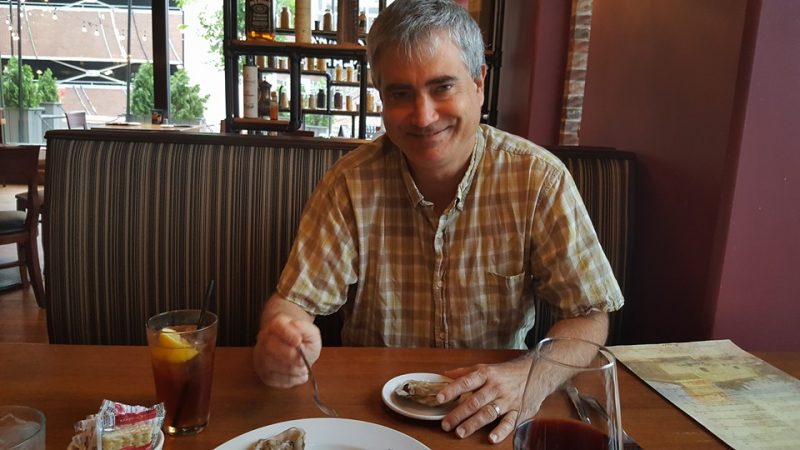By the time I reached adolescence, I had suffered emotionally under the weight of the unrest in my household, which included my parents’ divorce. I harbored a lot of anger and sadness. When I started to manifest indications of mental illness, it seemed reasonable that the conflict in my young life had something to do with it. Though my childhood emotional trauma was part of my psychological makeup, an added degree of problems arose from my bipolar disorder. I eventually learned that something was different about my brain.
The first symptoms of depression occurred in 1986 when I was a junior in high school. I was away at boarding school for my third year. Its onset was perhaps precipitated by high stress about the need for high academic achievement. I felt an extreme disconnection from everyone around me. Immediately, I felt overwhelmed by the demands of my classes. I slipped into a state of excruciating psychic pain. I thought about suicide as a solution to relieve my pain. Fortunately, I sought help from the school psychologist and was admitted to the infirmary. Shortly thereafter I took a leave of absence and went back to my hometown where I continued to seek help.
At the time I was using drugs and alcohol addictively, so I was able to use that as an alibi for the source of my depression. I believed if I could curtail my drinking and drug use, my symptoms would dissipate. As I continued to use drugs and drink, emerging bipolar symptoms continued to go undiagnosed and untreated. Eventually, I experienced a manic episode.
My first manic episode occurred when I was 17. I experienced a diminished need for sleep, a great feeling of well-being, and delusions of grandeur. For example, I believed I played a big part in human history. I also perceived supernatural events. I was quite famous in my mind. My erratic behavior caught up with me. After wandering the halls of my school psychotic, I was committed to a psychiatric ward. At this point, I was voluntarily committed and administered medication for a preliminary diagnosis of schizoaffective disorder.
After my first hospitalization, I began my journey in sobriety. For me, it was necessary to stop using drugs and alcohol, because of my addiction. However, once I was free from substances, my psychiatric symptoms did not cease. I needed to seek help with regards to my mental illness. After a few years of periodic psychotic episodes, I received my current diagnosis of bipolar disorder.
In the years that followed, I suffered five more manic episodes free from all drugs and alcohol. In the intervals between episodes I made progress in life. The longest interval was ten years. I complied with the medication and was in agreement about my diagnosis as bipolar. I advanced in school, formed relationships, stayed drug and alcohol free. However, each manic episode compromised everything in my life and set me back depressed and demoralized. I realized that I was on a learning curve of how to live with mental illness.
Each relapse showed me I had to deeply accept the vulnerabilities that came with the condition. I learned that not only did I need to maintain my regimen with medication, but my lifestyle needed to be in harmony with my mental health goals. For me, this meant that I needed adequate sleep, a way to manage stress, and a reevaluation of how to temper unrealistic ambition. Managing my mental illness became a priority, and I had to adopt new attitudes that countered those of the culture. For example, how I evaluated success was not by prestige and status, but by mental health. This was not easy because I had been driven to excel in professional life, which fed into my mania. At times I tried to channel manic energy into accomplishment to disastrous ends. So I settled into a manageable professional life that came with as much stress that I can handle.
With the help of psychiatric treatment and a support group, I have been able to weather ups and downs in life. I have experienced the death of both of my parents and the grief that has come with it. In addition, I have weathered colon cancer diagnosis. It required emergency surgery. Before the procedure, I was able to communicate to the medical team that I had bipolar disorder and was on medications for it. That enabled there to be no prolonged interruption to my medication while in recovery. I was able to go through the stress of surgery and a cancer diagnosis without getting manic or overly depressed.
Through the acceptance of help and some experience, I have been able to have a fulfilling life with mental illness. Without help, I would not have been able to maintain relationships or employment, things that greatly enrich my life. I still struggle at times, and deal with spells of low grade depression. I sometimes have the urge to get lost in mania. Each course correction towards better mental health has yielded great benefit and has led me along a workable path.
Zak Wardell is from Baltimore, Maryland. He graduated from UMBC in 1995 with a minor in creative writing and a double major in mathematics and physics. In 2003, he received a Ph.D. in physics from the University of Missouri. He now resides in Columbia, Missouri and currently teaches physics.









Leave A Comment